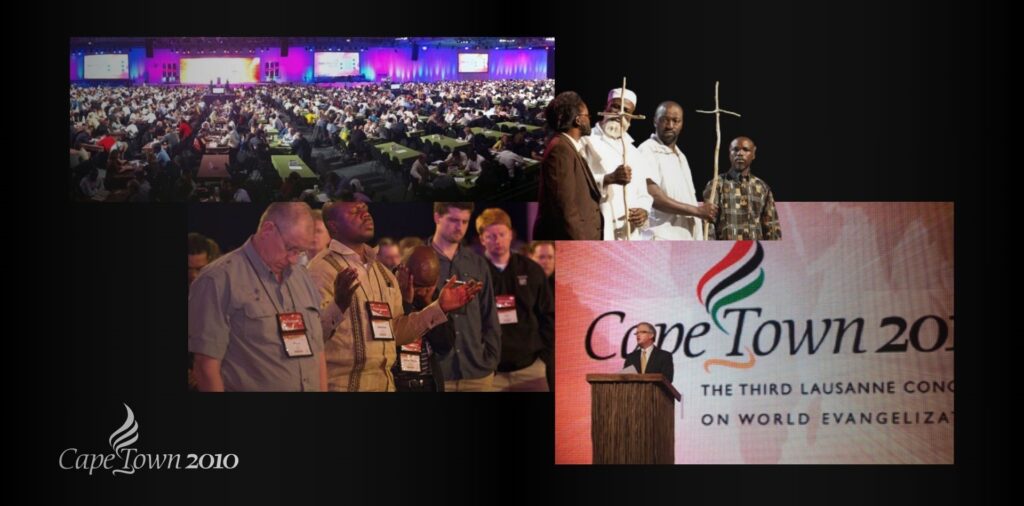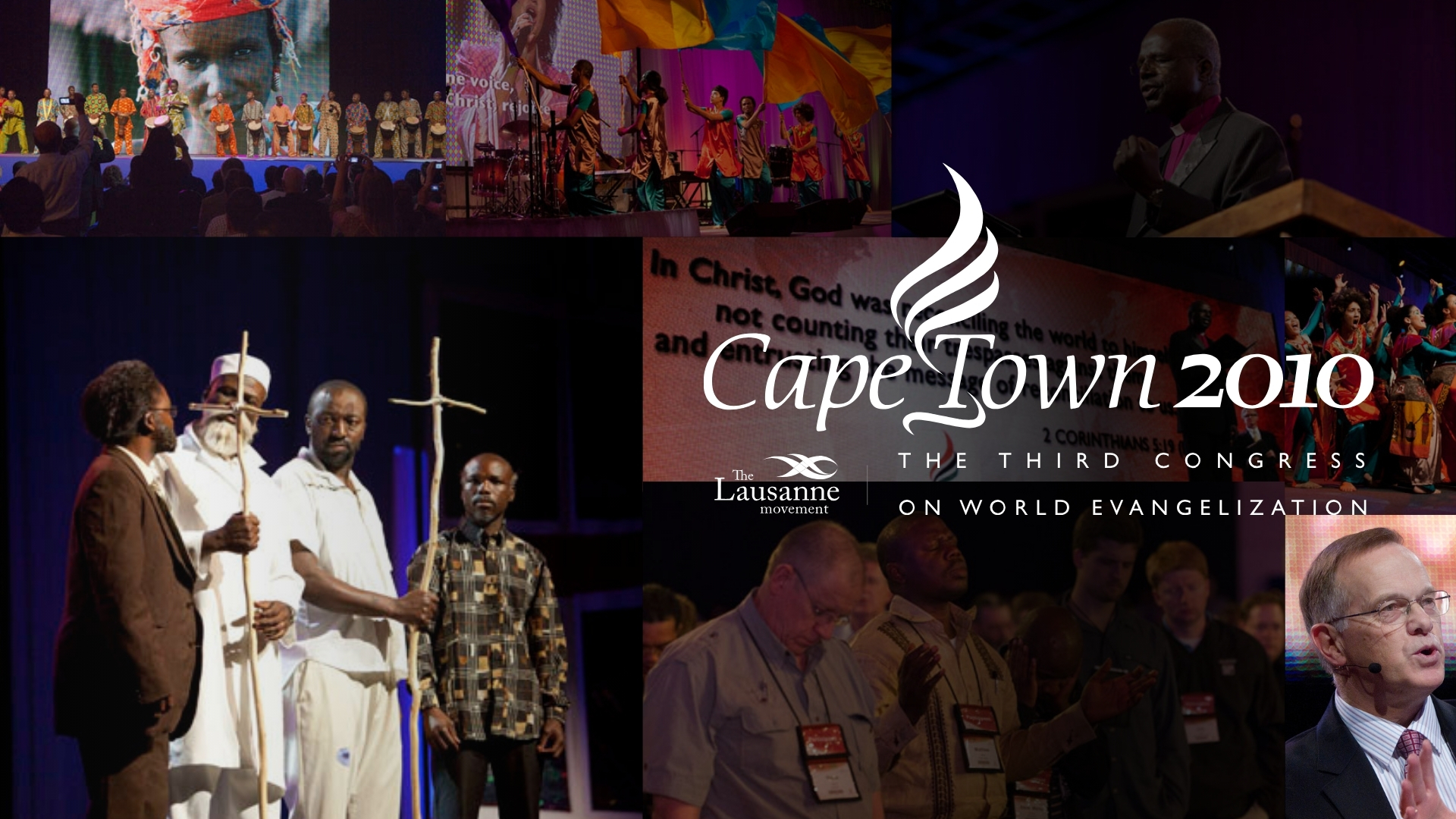Editor's Note
This Cape Town 2010 Advance Paper was written by Chris Wright as an overview of the topic to be discussed at the related session on “Calling the Church of Christ Back to Humility, Integrity and Simplicty” at the Cape Town 2010 Congress. Responses to this paper through the Lausanne Global Conversation were fed back to the author and others to help shape their final presentations at the Congress.
The Lausanne Covenant is wonderfully balanced in the way it binds together two dimensions of Christian confession. On the one hand there is the confession of faith – that is, affirming the great truths of our biblical faith. On the other hand there is the confession of failure – that is, accepting that in so many ways we Christians do not live up to the calling of God. We do not behave as disciples of the Lord Jesus Christ. So there is both proclamation and penitence: rejoicing over what we believe and repentance over how we have failed to live it out.
This is a balance that reflects some great occasions of covenant renewal in the Bible. For example: Deuteronomy 29-31, Joshua 23-24, 2 Kings 22-23, Nehemiah 8-10. These all included recognition of failure and sin. They all called people back to repentance and re-commitment.
It is tragic that many of the things that the Lausanne Covenant called us to turn away from, back in 1974, are still the very things that afflict and infect the church 36 years on. However, this should not depress us or paralyse us. Rather, it challenges us to come back yet again to our gracious God in renewed repentance and recommitment in our own generation.
Points of Penitence in the Lausanne Covenant
It is worth reading through the Lausanne Covenant and taking note of those places where it expresses failure, or a sense of shame and sorrow, or where it calls for repentance and change. The Covenant still speaks powerfully today. Here are several passages worth thinking about, in a spirit of prayer and humility. The numbers on the left refer to the paragraphs of the Lausanne covenant.
Paragraphs:
1. The Purpose of God
We confess with shame that we have often denied our calling and failed in our mission, by becoming conformed to the world or by withdrawing from it.
4. The Nature of Evangelism
In issuing the gospel invitation we have no liberty to conceal the cost of discipleship. Jesus still calls all who would follow him to deny themselves, take up their cross, and identify themselves with his new community. The results of evangelism include obedience to Christ, incorporation into his Church and responsible service in the world.
Costly obedience, self-denial, identification with the cross, commitment to the church, and practical service – these are all things that need to be included when we engage in evangelism. If we avoid these things, our message and method lack integrity and become manipulation.
6. The Church and Evangelism
The Church is at the very centre of God’s cosmic purpose and is his appointed means of spreading the gospel. But a church which preaches the cross must itself be marked by the cross. It becomes a stumbling block to evangelism when it betrays the gospel or lacks a living faith in God, a genuine love for people, or scrupulous honesty in all things including promotion and finance.
This powerful statement highlights the fact that the church is not just the delivery mechanism for a verbal message. Rather, God intends the church to be a model of the gospel it preaches – especially modeling the way of the cross. Three things are “stumbling-blocks” – that is, they make our evangelism fail: lack of faith, lack of love, and lack of honesty. There must be integrity between our words and our living. And we must repent when there isn’t.
6 The church is the community of God’s people rather than an institution, and must not be identified with any particular culture, social or political system, or human ideology.
The danger described here is a constant temptation. We can be filled with unbiblical pride in our own culture. Or we have a sense of national or racial superiority. Or we put absolute faith in our economic system. As a result, the church becomes captive to the idols and ideology that surround us.
9. The Urgency of the Evangelistic Task
We cannot hope to attain this goal without sacrifice [“the goal” of enabling everyone to hear the gospel]. All of us are shocked by the poverty of millions and disturbed by the injustices which cause it. Those of us who live in affluent circumstances accept our duty to develop a simple life-style in order to contribute more generously to both relief and evangelism.
The call to simplicity of life is part of Christlike discipleship. But we are so tempted by the seductive power of greed and self-gratification. The call to sacrifice and simplicity needs to be heard again, for it is so much contradicted by the desire for prosperity and success.
This was a challenge that led to a whole consultation and statement, “The International Consultation on Simple Lifestyle”, at Hoddesdon, 1980. The statement can be read in Lausanne Occasional Paper 20, or at https://lausanne.org/hoddesdon-1980/hoddesdon-1980.html
11. Education and leadership
We confess that we have sometimes pursued church growth at the expense of church depth, and divorced evangelism from Christian nurture.
This plague of “growth without depth” has become even worse after 1974. As the end of the millennium approached many mission strategies and organizations arose that were obsessed with speed and “getting the job finished”. “Christian superficiality has become aworldwide phenomenon. Many converts never grow up in Christ” (Lausanne Occasional Paper 3 p. 40). In some organizations, theological education and training were even dropped from the mission agenda and investment, which seems tragically short-sighted.
But if we fail to obey the Great Commission Line Three (“teaching them all that I have commanded you”), we are actually failing to obey it at all in “making disciples”. And the result is seen in widespread nominalism in so-called “reached” nations.
11 We long that every church will have national leaders who manifest a Christian style of leadership in terms not of domination but of service.
This is reinforced by the exposition:
“National leaders are no more immune than missionaries to the sins of pride, power-hunger, and pomposity. So our longing is for national leaders who manifest a Christian style of leadership, drawing their inspiration not from secular government but from Christ’s teaching and example, a leadership in terms not of domination but of service.” (Lausanne Occasional Paper 3, p.39)
The temptation to seek power and status is very strong, and sadly very many evangelical leaders give in to it, and do not follow either Christ’s teaching or his example. “Domination” can take many forms within the church itself by leaders and pastors, including abuse of trust, exploitation for personal gain, suppression of women, manipulation of money or power.
12. Spiritual Conflict
We detect the activity of our enemy, not only in false ideologies outside the Church, but also inside it in false gospels which twist Scripture and put people in the place of God … At other times, desirous to ensure a response to the gospel, we have compromised our message, manipulated our hearers through pressure techniques, and become unduly preoccupied with statistics or even dishonest in our use of them.
Deception and manipulation are the hallmarks of Satan’s character and work, and this paragraph warns us to be alert to their presence within the church – even in what looks like enthusiastic and successful mission. Once again John Stott’s exposition is powerfully clear.
“The numerical growth of the church has become almost an obsession withus. And therefore, desirous (even determined) to ensure a response to the Gospel,we have resorted to doubtful methods, which Paul would almost certainly haveincluded in the “disgraceful underhanded ways” which he said he had renounced (IICor. 4:2). Either we have compromised our message (“tampered with God’s Word”;IICor. 4:2), eliminating such unfashionable elements as self-denial and judgment inorder to make it more palatable to modern man; or we have manipulated ourhearers through pressure techniques, which is to treat human beings as less thanhuman; or we have become unduly preoccupied with statistics (as if the work of theHoly Spirit of God could ever be reduced to mere statistics!), or even dishonest inour use of them (publishing reports which are not strictly true). It is an ugly list ofmisdemeanors.” (Lausanne Occasional Paper 3, p.45)
The core issue here is the danger of manipulation and dishonesty. We need to return to rigorous integrity in all our efforts to promote the gospel. Satan is at work whenever Christians surrender their integrity and go along with what is untruthful and dishonest (even if they believe it is for good motives).

Three Key Challenges
Most of the challenges addressed to the church in the Lausanne Covenant could be gathered under three main topics. These are topics that are also major issues in the Bible. Everywhere in the Bible, God constantly calls his people to turn away from idols of power, success and greed, and to live according to his demand for humility, integrity and simplicity.
The idolatry of power, and the call to humility
The temptation to seek power and status is very strong. It reflects our fallen nature, since the essence of the fall was to usurp God’s authority by exalting our own status over against God. That is also one of the fingerprints of Satan. So it is tragic that so many Christian leaders fall into this sin and exalt themselves. We urgently need to recognize and denounce this for the sin that it is.
By contrast, humility is one of the essential marks of Jesus Christ, and ought therefore to characterize his followers – especially those called to leadership.
The idolatry of success, and the call to integrity
The temptation to impress others with our accomplishments, skills, or miraculous powers is also very strong. We crave for success and recognition. But this easily leads to distortion of the truth and manipulation of people. It leads to dishonesty in reports, in finances, in personal life and relationships. We need to hear again the Bible’s constant call to integrity, in private and public, in every corner of our lives and ministries. There is no biblical mission without biblical ethics.
The idolatry of greed, and the call to simplicity
“Covetousness which is idolatry”, said Paul (Col. 3:5). To break the tenth commandment is to break the first. The Bible recognizes legitimate wealth as a good gift of God’s generosity. But the Bible speaks far more often about the idol that wealth can easily become. Throughout the Bible there are warnings against greed and the dangers of seeking wealth, some of them from the mouth of Jesus himself. Jesus and Paul both modelled simple dependence on God and contentment with ‘enough’.
Biblical Resources
In preparation for the late morning plenary session on Day 5, you could study some Bible passages on each of the above major themes. Here are some to start with. Perhaps you could add more.
Humility vs Power:
Isaiah 2:12-17,Micah 6:8, Prov.11:2, Luke 22:24-27, Matt. 5:1-12, Eph. 4:1-2, 2 Tim. 3:1-5
Integrity vs Success:
Ezek. 13:1-7, 1 Chron. 29:17, Pss. 15, 24, Prov. 11:1, 3, Matt. 5:33-37, 2 Cor. 2:17, 4:1-2, Rev. 22:15
Simplicity vs Greed:
Mic. 3:5,11, Jer. 22:13-17, 1 Kings 21, Matt. 7:21-23, Luke 12:13-21, Eph. 5:5, 1 Tim. 6:5-10
Jesus faced all of the three temptations we have identified.
- The devil offered him power and status over all nations, from a high mountain. Jesus refused it, choosing to worship God alone.
- The devil suggested he manipulate the crowds by a spectacular death-defying miracle. Jesus recognized the satanic twisting of Scripture and preserved the integrity of his trust in God.
- The devil dangled before him the lucrative prospect of abundant food for himself and the hungry masses. Jesus resisted with the scriptural truth that God could supply bread, but human beings need greater food for life than that.
Sadly, it seems that so many Christian leaders (including mission leaders) blatantly fail these tests at precisely the points that Jesus overcame them. They cannot resist the temptations of abusive power, manipulated success and selfish greed. The church as a whole pays the cost of their failure, in the loss of integrity and credibility.

Contemporary Concerns
Here are some of the things we need to think about as matters for repentance – for “coming back to God in humility, integrity and simplicity”.
Abuse of power and status
- The “crisis of leadership” could be better described as a “crisis of servanthood”.
- There are mega-pastors lording it over churches, with unaccountable power and phenomenal wealth.
- Some of us wield power that comes solely from the dominant culture to which our churches or organizations are bound. We abuse our ethnic or cultural power.
- Power and status can be abused in many ways, including the superiority complexes of caste, race, tribe or gender.
Lack of integrity
- Can we trust all the inflated statistics thrown around the world of Christian mission? What are they there for? What do they prove? Whom do they flatter? Whom do they diminish? What damage can they do?
- Exaggeration or sheer invention are commonly admitted to (in private if not in public) by those who have to produce reports on the “success” of their mission, sometimes under pressure from those who demand them as a condition of funding.
- Are there methods of evangelism that are simply unbiblical and unethical, driven by “success” and “speed”, rather than by obedience to all that Jesus commanded?
Greed
- The Prosperity Gospel is one of the most widespread manifestations of Christianity on earth today. How should it be evaluated biblically? To what should its rampant success be attributed?
- Those who preach Prosperity often quote the Bible, but do they do so with integrity?
- Some Prosperity Teachers emphasize the biblical exhortations to work hard and take responsibility for oneself. But many others appeal to sheer greed and ambition.
- The teaching flourishes in contexts of poverty and lack of opportunity, but does it provide a biblical answer to such need, especially if it pays little attention to issues of justice that the Bible emphasizes?

